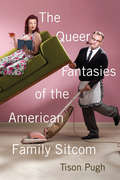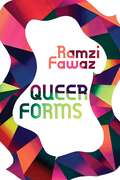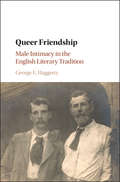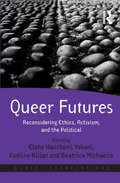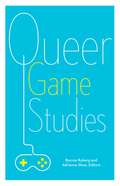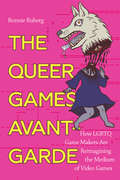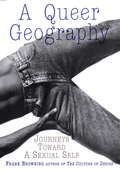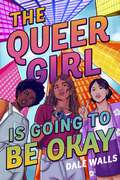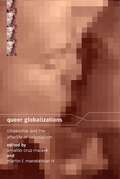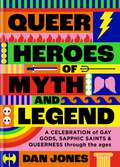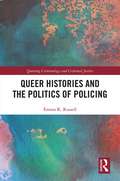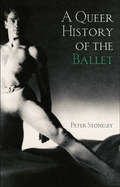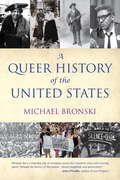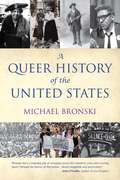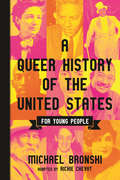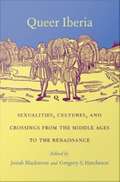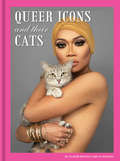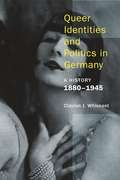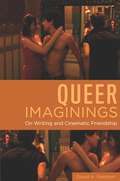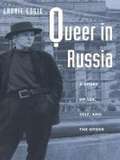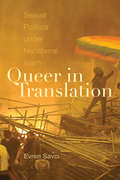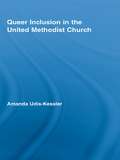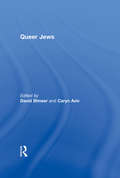- Table View
- List View
The Queer Fantasies of the American Family Sitcom
by Tison PughThe Queer Fantasies of the American Family Sitcom examines the evasive depictions of sexuality in domestic and family-friendly sitcoms. Tison Pugh charts the history of increasing sexual depiction in this genre while also unpacking how sitcoms use sexuality as a source of power, as a kind of camouflage, and as a foundation for family building. The book examines how queerness, at first latent, became a vibrant yet continually conflicted part of the family-sitcom tradition. Taking into account elements such as the casting of child actors, the use of and experimentation with plot traditions, the contradictory interpretive valences of comedy, and the subtle subversions of moral standards by writers and directors, Pugh points out how innocence and sexuality conflict on television. As older sitcoms often sit on a pedestal of nostalgia as representative of the Golden Age of the American Family, television history reveals a deeper, queerer vision of family bonds.
Queer Forms
by Ramzi FawazHow do we represent the experience of being a gender and sexual outlaw? In Queer Forms, Ramzi Fawaz explores how the central values of 1970s movements for women’s and gay liberation—including consciousness-raising, separatism, and coming out of the closet—were translated into a range of American popular culture forms. Throughout this period, feminist and gay activists fought social and political battles to expand, transform, or wholly explode definitions of so-called “normal” gender and sexuality. In doing so, they inspired artists, writers, and filmmakers to invent new ways of formally representing, or giving shape to, non-normative genders and sexualities. This included placing women, queers, and gender outlaws of all stripes into exhilarating new environments—from the streets of an increasingly gay San Francisco to a post-apocalyptic commune, from an Upper East Side New York City apartment to an all-female version of Earth—and finding new ways to formally render queer genders and sexualities by articulating them to figures, outlines, or icons that could be imagined in the mind’s eye and interpreted by diverse publics. Surprisingly, such creative attempts to represent queer gender and sexuality often appeared in a range of traditional, or seemingly generic, popular forms, including the sequential format of comic strip serials, the stock figures or character-types of science fiction genre, the narrative conventions of film melodrama, and the serialized rhythm of installment fiction. Through studies of queer and feminist film, literature, and visual culture including Mart Crowley’s The Boys in the Band (1970), Armistead Maupin’s Tales of the City (1976–1983), Lizzy Borden’s Born in Flames (1983), and Tony Kushner’s Angels in America (1989–1991), Fawaz shows how artists innovated in many popular mediums and genres to make the experience of gender and sexual non-conformity recognizable to mass audiences in the modern United States.Against the ideal of ceaseless gender and sexual fluidity and attachments to rigidly defined identities, Queer Forms argues for the value of shapeshifting as the imaginative transformation of genders and sexualities across time. By taking many shapes of gender and sexual divergence we can grant one another the opportunity to appear and be perceived as an evolving form, not only to claim our visibility, but to be better understood in all our dimensions.
Queer Friendship: Male Intimacy in the English Literary Tradition
by George E. HaggertyFriendship in the classical world was celebrated as among the highest human achievements: nothing was more likely to lead to the divine than looking for it in the eyes of a friend. In exploring the complexities of male-male relations beyond the simple labels of sexuality, Queer Friendship shows how love between men has a rich and varied history in English literature. The friend could offer a reflection of one's own worth and a celebration of a kind of mutuality that was not connected to family or home. These same-sex friendships are memorable because they give shape to the novels of which they are a part, and question the assumption that the love between friends is different from the love between lovers. Queer Friendship explores English literary friendship in three ways: the elegiac, the erotic, and the platonic, by considering a myriad of works, including Sterne's Tristram Shandy, Tennyson's 'In Memoriam A. H. H.', and Dickens' Great Expectations.
Queer Futures: Reconsidering Ethics, Activism, and the Political (Queer Interventions)
by Eveline Kilian Elahe Haschemi Yekani Beatrice MichaelisFollowing debates surrounding the anti-social turn in queer theory in recent years, there has been a renewed interest in the role of activism, the limits of the political, and the question of normativity and ethics. Queer Futures engages with these concerns, exploring issues of complicity and agency with a central focus on the material and economic as well as philosophical dimensions of sexual politics. Presenting some of the latest research in queer theory, this book draws together diverse perspectives to shed light on possible ’queer futures’ when different affective, temporal, and local contexts are brought into play. As such, it will appeal to scholars of cultural, political, literary, and social theory, as well as those with interests in gender and sexuality, activism, and queer theory.
Queer Game Studies
by Adrienne Shaw Bonnie RubergVideo games have developed into a rich, growing field at many top universities, but they have rarely been considered from a queer perspective. Immersion in new worlds, video games seem to offer the perfect opportunity to explore the alterity that queer culture longs for, but often sexism and discrimination in gamer culture steal the spotlight. Queer Game Studies provides a welcome corrective, revealing the capacious albeit underappreciated communities that are making, playing, and studying queer games.These in-depth, diverse, and accessible essays use queerness to challenge the ideas that have dominated gaming discussions. Demonstrating the centrality of LGBTQ issues to the gamer world, they establish an alternative lens for examining this increasingly important culture. Queer Game Studies covers important subjects such as the representation of queer bodies, the casual misogyny prevalent in video games, the need for greater diversity in gamer culture, and reading popular games like Bayonetta, Mass Effect, and Metal Gear Solid from a queer perspective. Perfect for both everyday readers and instructors looking to add diversity to their courses, Queer Game Studies is the ideal introduction to the vast and vibrant realm of queer gaming. Contributors: Leigh Alexander; Gregory L. Bagnall, U of Rhode Island; Hanna Brady; Mattie Brice; Derek Burrill, U of California, Riverside; Edmond Y. Chang, U of Oregon; Naomi M. Clark; Katherine Cross, CUNY; Kim d’Amazing, Royal Melbourne Institute of Technology; Aubrey Gabel, U of California, Berkeley; Christopher Goetz, U of Iowa; Jack Halberstam, U of Southern California; Todd Harper, U of Baltimore; Larissa Hjorth, Royal Melbourne Institute of Technology; Chelsea Howe; Jesper Juul, Royal Danish Academy of Fine Arts; merritt kopas; Colleen Macklin, Parsons School of Design; Amanda Phillips, Georgetown U; Gabriela T. Richard, Pennsylvania State U; Toni Rocca; Sarah Schoemann, Georgia Institute of Technology; Kathryn Bond Stockton, U of Utah; Zoya Street, U of Lancaster; Peter Wonica; Robert Yang, Parsons School of Design; Jordan Youngblood, Eastern Connecticut State U.
The Queer Games Avant-Garde: How LGBTQ Game Makers Are Reimagining the Medium of Video Games
by Bonnie RubergIn The Queer Games Avant-Garde, Bonnie Ruberg presents twenty interviews with twenty-two queer video game developers whose radical, experimental, vibrant, and deeply queer work is driving a momentous shift in the medium of video games. Speaking with insight and candor about their creative practices as well as their politics and passions, these influential and innovative game makers tell stories about their lives and inspirations, the challenges they face, and the ways they understand their places within the wider terrain of video game culture. Their insights go beyond typical conversations about LGBTQ representation in video games or how to improve “diversity” in digital media. Instead, they explore queer game-making practices, the politics of queer independent video games, how queerness can be expressed as an aesthetic practice, the influence of feminist art on their work, and the future of queer video games and technology. These engaging conversations offer a portrait of an influential community that is subverting and redefining the medium of video games by placing queerness front and center.Interviewees:Ryan Rose Aceae, Avery Alder, Jimmy Andrews, Santo Aveiro-Ojeda, Aevee Bee, Tonia B******, Mattie Brice, Nicky Case, Naomi Clark, Mo Cohen, Heather Flowers, Nina Freeman, Jerome Hagen, Kat Jones, Jess Marcotte, Andi McClure, Llaura McGee, Seanna Musgrave, Liz Ryerson, Elizabeth Sampat, Loren Schmidt, Sarah Schoemann, Dietrich Squinkifer, Kara Stone, Emilia Yang, Robert Yang
A Queer Geography
by Frank BrowningThe Author of the best-selling The Culture of Desire journeys into the minds of gay men in America and around the world to discover how their lives - and their desires - are shaped by the time, place, and culture in which they live.
The Queer Girl is Going to Be Okay
by Dale WallsQueer Love. Something Dawn wants, desperately, but does not have. But maybe, if she can capture it, film it, interview the people who have it, queer love will be hers someday. Or, at least, she'll have made a documentary about it. A documentary that, hopefully, will win Dawn a scholarship to film school. Many obstacles stand in the way of completing her film, but her best friends Edie and Georgia are there to help her reach her goal, no matter what it takes. A touching and joyous story of queer friendship and girlhood set in the vibrant city of Houston, THE QUEER GIRL IS GOING TO BE OKAY will make you laugh, make you cry, and make you believe that eventually, everything will be okay.
Queer Globalizations: Citizenship and the Afterlife of Colonialism (Sexual Cultures #9)
by Martin F. Manalansan Arnaldo Cruz-MalaveGlobalization has a taste for queer cultures. Whether in advertising, film, performance art, the internet, or in the political discourses of human rights in emerging democracies, queerness sells and the transnational circulation of peoples, identities and social movements that we call "globalization" can be liberating to the extent that it incorporates queer lives and cultures. From this perspective, globalization is seen as allowing the emergence of queer identities and cultures on a global scale. The essays in Queer Globalizations bring together scholars of postcolonial and lesbian and gay studies in order to examine from multiple perspectives the narratives that have sought to define globalization. In examining the tales that have been spun about globalization, these scholars have tried not only to assess the validity of the claims made for globalization, they have also attempted to identify the tactics and rhetorical strategies through which these claims and through which global circulation are constructed and operate. Contributors include Joseba Gabilondo, Gayatri Gopinath, Janet Ann Jakobsen, Miranda Joseph, Katie King, William Leap, Lawrence LaFountain-Stokes, Bill Maurer, Cindy Patton, Chela Sandoval, Ann Pellegrini, Silviano Santiago, and Roberto Strongman.
Queer Heroes of Myth and Legend: A celebration of gay gods, sapphic saints, and queerness through the ages
by Dan JonesHidden in the margins of history books, classical literature, and thousands of years of stories, myths and legends, through to contemporary literature, TV and film, there is a diverse and other-worldly super community of queer heroes to discover, learn from, and celebrate. Be captivated by stories of forbidden love like Patroclus & Achilles (explored in Madeleine Miller's bestseller Song of Achilles), join the cult of Antinous (inspiration for Oscar Wilde), get down with pansexual god Set in Egyptian myth, and fall for Zimbabwe's trans God Mawi. And from modern pop-culture, through Dan Jones's witty, upbeat style, learn more about 90s fan obsessions Xena: Warrior Princess and Buffy the Vampire Slayer, Neil Gaiman's American Gods and the BBC's Doctor Who. Queer Heroes of Myth & Legend brings to life characters who are romantic, brave, mysterious, and always fantastical. It is a magnificent celebration of queerness through the ages in all its legendary glory.
Queer Heroes of Myth and Legend: A celebration of gay gods, sapphic saints, and queerness through the ages
by Dan JonesHidden in the margins of history books, classical literature, and thousands of years of stories, myths and legends, through to contemporary literature, TV and film, there is a diverse and other-worldly super community of queer heroes to discover, learn from, and celebrate. Be captivated by stories of forbidden love like Patroclus & Achilles (explored in Madeleine Miller's bestseller Song of Achilles), join the cult of Antinous (inspiration for Oscar Wilde), get down with pansexual god Set in Egyptian myth, and fall for Zimbabwe's trans God Mawi. And from modern pop-culture, through Dan Jones's witty, upbeat style, learn more about 90s fan obsessions Xena: Warrior Princess and Buffy the Vampire Slayer, Neil Gaiman's American Gods and the BBC's Doctor Who. Queer Heroes of Myth & Legend brings to life characters who are romantic, brave, mysterious, and always fantastical. It is a magnificent celebration of queerness through the ages in all its legendary glory.
Queer Histories and the Politics of Policing (Queering Criminology and Criminal Justice)
by Emma K. RussellDespite ongoing challenges to the criminalisation and surveillance of queer lives, police leaders are now promoted as allies and defenders of LGBT rights. However, in this book, Emma K. Russell argues that the surface inclusion of select LGBT identities in the protective aspirations of the law is deeply tenuous and conditional, and that police recognition is both premised upon and reproductive of an imaginary of' 'good queer citizens'—those who are respectable, responsible, and 'just like' their heterosexual counterparts. Based on original empirical research, Russell presents a detailed analysis of the political complexities, compromises, and investments that underpin LGBT efforts to achieve sexual rights and protections. With a historical trajectory that spans the so-called 'decriminalisation' era to the present day, she shows how LGBT activists have both resisted and embraced police incursions into queer space, and how—with LGBT support—police leaders have re-crafted histories of violence as stories of institutional progress. Queer Histories and the Politics of Policing advances broader understandings of the nature of police power and the shifting terrain of sexual citizenship. It will be of interest to students and researchers of criminology, sociology, and law engaged in studies of policing, social justice, and gender and sexuality.
A Queer History of the Ballet
by Peter StoneleyDesigned for students, scholars and general readers with an interest in dance and queer history, A Queer History of the Ballet focuses on how, as makers and as audiences, queer men and women have helped to develop many of the texts, images, and legends of ballet. Presenting a series of historical case studies, the book explores the ways in which, from the nineteenth century into the twentieth, ballet has been a means of conjuring homosexuality – of enabling some degree of expression and visibility for people who were otherwise declared illegal and obscene. Studies include: the perverse sororities of the Romantic ballet the fairy in folklore, literature, and ballet Tchaikovsky and the making of Swan Lake Diaghilev’s Ballets Russes and the emergence of queer modernity the formation of ballet in America the queer uses of the prima ballerina Genet’s writings for and about ballet. Also including a consideration of how ballet’s queer tradition has been memorialized by such contemporary dance-makers as Neumeier, Bausch, Bourne, and Preljocaj, this is an essential book in the study of ballet and queer history.
A Queer History of the United States (ReVisioning American History #1)
by Michael BronskiWinner of a 2012 Stonewall Book Award in nonfictionThe first book to cover the entirety of lesbian, gay, bisexual, and transgender history, from pre-1492 to the present.In the 1620s, Thomas Morton broke from Plymouth Colony and founded Merrymount, which celebrated same-sex desire, atheism, and interracial marriage. Transgender evangelist Jemima Wilkinson, in the early 1800s, changed her name to “Publick Universal Friend,” refused to use pronouns, fought for gender equality, and led her own congregation in upstate New York. In the mid-nineteenth century, internationally famous Shakespearean actor Charlotte Cushman led an openly lesbian life, including a well-publicized “female marriage.” And in the late 1920s, Augustus Granville Dill was fired by W. E. B. Du Bois from the NAACP’s magazine the Crisis after being arrested for a homosexual encounter. These are just a few moments of queer history that Michael Bronski highlights in this groundbreaking book. Intellectually dynamic and endlessly provocative, A Queer History of the United States is more than a “who’s who” of queer history: it is a book that radically challenges how we understand American history. Drawing upon primary documents, literature, and cultural histories, noted scholar and activist Michael Bronski charts the breadth of lesbian, gay, bisexual, and transgender history, from 1492 to the 1990s, and has written a testament to how the LGBT experience has profoundly shaped our country, culture, and history. A Queer History of the United States abounds with startling examples of unknown or often ignored aspects of American history—the ineffectiveness of sodomy laws in the colonies, the prevalence of cross-dressing women soldiers in the Civil War, the impact of new technologies on LGBT life in the nineteenth century, and how rock music and popular culture were, in large part, responsible for the devastating backlash against gay rights in the late 1970s. Most striking, Bronski documents how, over centuries, various incarnations of social purity movements have consistently attempted to regulate all sexuality, including fantasies, masturbation, and queer sex. Resisting these efforts, same-sex desire flourished and helped make America what it is today. At heart, A Queer History of the United States is simply about American history. It is a book that will matter both to LGBT people and heterosexuals. This engrossing and revelatory history will make readers appreciate just how queer America really is. From the Hardcover edition.
A Queer History of the United States
by Michael BronskiThe first book to cover the entirety of lesbian, gay, bisexual, and transgender history, from pre-1492 to the present. In the 1620s, Thomas Morton broke from Plymouth Colony and founded Merrymount, which celebrated same-sex desire, atheism, and interracial marriage. Transgender evangelist Jemima Wilkinson, in the early 1800s, changed her name to "Publick Universal Friend," refused to use pronouns, fought for gender equality, and led her own congregation in upstate New York. In the mid-nineteenth century, internationally famous Shakespearean actor Charlotte Cushman led an openly lesbian life, including a well-publicized "female marriage." And in the late 1920s, Augustus Granville Dill was fired by W. E. B. Du Bois from the NAACP's magazine the Crisis after being arrested for a homosexual encounter. These are just a few moments of queer history that Michael Bronski highlights in this groundbreaking book. Intellectually dynamic and endlessly provocative, A Queer History of the United States is more than a who's who of queer history: it is a book that radically challenges how we understand American history. Drawing upon primary documents, literature, and cultural histories, noted scholar and activist Michael Bronski charts the breadth of lesbian, gay, bisexual, and transgender history, from 1492 to the 1990s, and has written a testament to how the LGBT experience has profoundly shaped our country, culture, and history. A Queer History of the United States abounds with startling examples of unknown or often ignored aspects of American history-the ineffectiveness of sodomy laws in the colonies, the prevalence of cross-dressing women soldiers in the Civil War, the impact of new technologies on LGBT life in the nineteenth century, and how rock music and popular culture were, in large part, responsible for the devastating backlash against gay rights in the late 1970s. Most striking, Bronski documents how, over centuries, various incarnations of social purity movements have consistently attempted to regulate all sexuality, including fantasies, masturbation, and queer sex. Resisting these efforts, same-sex desire flourished and helped make America what it is today. At heart, A Queer History of the United States is simply about American history. It is a book that will matter both to LGBT people and heterosexuals. This engrossing and revelatory history will make readers appreciate just how queer America really is.
A Queer History of the United States for Young People (ReVisioning American History for Young People #1)
by Michael BronskiQueer history didn't start with Stonewall. This book explores how LGBTQ people have always been a part of our national identity, contributing to the country and culture for over 400 years.It is crucial for lesbian, gay, bisexual, transgender, and queer youth to know their history. But this history is not easy to find since it's rarely taught in schools or commemorated in other ways. A Queer History of the United States for Young People corrects this and demonstrates that LGBTQ people have long been vital to shaping our understanding of what America is today. Through engrossing narratives, letters, drawings, poems, and more, the book encourages young readers, of all identities, to feel pride at the accomplishments of the LGBTQ people who came before them and to use history as a guide to the future. Here we meet: * Indigenous tribes who embraced same-sex relationships and a multiplicity of gender identities. * Emily Dickinson, brilliant nineteenth-century poet who wrote about her desire for women. * Gladys Bentley, Harlem blues singer who challenged restrictive cross-dressing laws in the 1920s. * Bayard Rustin, Dr. Martin Luther King Jr.'s close friend, civil rights organizer, and an openly gay man. * Sylvia Rivera, cofounder of STAR, the first transgender activist group in the US in 1970. * Kiyoshi Kuromiya, civil rights and antiwar activist who fought for people living with AIDS. * Jamie Nabozny, activist who took his LGBTQ school bullying case to the Supreme Court. * Aidan DeStefano, teen who brought a federal court case for trans-inclusive bathroom policies. * And many more!With over 60 illustrations and photos, a glossary, and a corresponding curriculum, A Queer History of the United States for Young People will be vital for teachers who want to introduce a new perspective to America's story.
Queer Iberia: Sexualities, Cultures, and Crossings from the Middle Ages to the Renaissance
by Josiah Blackmore Gregory S. HutchesonMartyred saints, Moors, Jews, viragoes, hermaphrodites, sodomites, kings, queens, and cross-dressers comprise the fascinating mosaic of historical and imaginative figures unearthed in Queer Iberia. The essays in this volume describe and analyze the sexual diversity that proliferated during the period between the tenth and the sixteenth centuries when political hegemony in the region passed from Muslim to Christian hands. To show how sexual otherness is most evident at points of cultural conflict, the contributors use a variety of methodologies and perspectives and consider source materials that originated in Castilian, Latin, Arabic, Catalan, and Galician-Portuguese. Covering topics from the martydom of Pelagius to the exploits of the transgendered Catalina de Erauso, this volume is the first to provide a comprehensive historical examination of the relations among race, gender, sexuality, nation-building, colonialism, and imperial expansion in medieval and early modern Iberia. Some essays consider archival evidence of sexual otherness or evaluate the use of "deviance" as a marker for cultural and racial difference, while others explore both male and female homoeroticism as literary-aesthetic discourse or attempt to open up canonical texts to alternative readings. Positing a queerness intrinsic to Iberia's historical process and cultural identity, Queer Iberia will challenge the field of Iberian studies while appealing to scholars of medieval, cultural, Hispanic, gender, and gay and lesbian studies. Contributors. Josiah Blackmore, Linde M. Brocato, Catherine Brown, Israel Burshatin, Daniel Eisenberg, E. Michael Gerli, Roberto J. Gonzlez-Casanovas, Gregory S. Hutcheson, Mark D. Jordan, Sara Lipton, Benjamin Liu, Mary Elizabeth Perry, Michael Solomon, Louise O. Vasvri, Barbara Weissberger
Queer Icons and Their Cats
by Alison Nastasi PJ NastasiThese cat lovers are out and purr-oud!Freddie Mercury, Sylvia Rivera, Alison Bechdel, Dusty Springfield. This book is a celebration of queer icons of the past and present and their furry feline friends. From images of lost legends such as Josephine Baker and James Baldwin, to snapshots of contemporary trailblazers like comedian Tig Notaro and fashion designer Jason Wu—these charming and eccentric photographs capture what it truly means to be a cat purr-son.• PURR-FECT FOR CAT LOVERS: This book celebrates the love between human and cat. What better gift could you get the feline fancier in your life?• AMEWSING ANECDOTES AND IMPAWTENT MOMENTS: Learn about the lives of the queer heroes who came before us and those who are still fighting for equality and inclusion. We're not kitten around—with watershed moments like the Stonewall riots and sweet stories of domestic bliss, this book will both entertain and inspire you.• PHOTOS WITH CATITUDE: In these purr-ecious photographs, you'll get to see your heroes in unguarded moments expressing love for their pets. This collection of images will bring joy to any cat lover's heart.Perfect for: • LGBTQIA+ cat lovers and the people who shop for them• Anyone interested in learning more about influential queer figures—and their pets!
Queer Identities and Politics in Germany: A History, 1880–1945
by Clayton WhisnantGermany in the late nineteenth and early twentieth centuries witnessed key developments in LGBT history, including the growth of the world's first homosexual organizations and gay and lesbian magazines, as well as an influential community of German sexologists and psychoanalysts. Queer Identities and Politics in Germany describes these events in detail, from vibrant gay social scenes to the Nazi persecution that sent many LGBT people to concentration camps.Clayton J. Whisnant recounts the emergence of various queer identities in Germany from 1880 to 1945 and the political strategies pursued by early homosexual activists. Drawing on recent English and German-language scholarship, he enriches the debate over whether science contributed to social progress or persecution during this period, and he offers new information on the Nazis' preoccupation with homosexuality. The book's epilogue locates remnants of the pre-1945 era in Germany today.
Queer Imaginings: On Writing and Cinematic Friendship (Queer Screens)
by David A. GerstnerHow do we identify the "queer auteur" and their queer imaginings? Is it possible to account for such a figure when the very terms "queer" and "auteur" invoke aesthetic surprises and disorientations, disconcerting ironies and paradoxes, and biographical deceits and ambiguities? In eighteen eloquent chapters, David A. Gerstner traces a history of ideas that spotlight an ever-shifting terrain associated with auteur theory and, in particular, queer-auteur theory. Engaging with the likes of Oscar Wilde, Walter Benjamin, James Baldwin, Jean Louis Baudry, Linda Nochlin, Jane Gallop, Cáel Keegan, Luce Irigaray, and other prominent critical thinkers, Gerstner contemplates how the queer auteur in film theory might open us to the work of desire. Queer Imaginings argues for a queer-auteur in which critical theory is reenabled to reconceptualize the auteur in relation to race, gender, sexuality, and desire. Gerstner succinctly defines the contours of a history and the ongoing discussions that situate queer and auteur theories in film studies. Ultimately, Queer Imaginings is a journey in shared pleasures in which writing for and about cinema makes way for unanticipated cinematic friendships.
Queer in Russia: A Story of Sex, Self, and the Other
by Laurie EssigIn Queer in Russia Laurie Essig examines the formation of gay identity and community in the former Soviet Union. As a sociological fieldworker, she began her research during the late 1980s, before any kind of a public queer identity existed in that country. After a decade of conducting interviews, as well as observing and analyzing plays, books, pop music, and graffiti, Essig presents the first sustained study of how and why there was no Soviet gay community or even gay identity before perestroika and the degree to which this situation has--or has not--changed. While male homosexual acts were criminalized in Russia before 1993, women attracted to women were policed by the medical community, who saw them less as criminals than as diseased persons potentially cured by drug therapy or transsexual surgery. After describing accounts of pre-perestroika persecution, Essig examines the more recent state of sexual identities in Russia. Although the fall of communism brought new freedom to Russian queers, there are still no signs of a mass movement forming around the issue, and few identify themselves as lesbians or gay men, even when they are involved in same-sex relations. Essig does reveal, however, vibrant manifestations of gay life found at the local level--in restaurants, discos, clubs, and cruising strips, in newspapers, journals, literature, and the theater. Concluding with a powerful exploration of the surprising affinities between some of Russia's most prominent nationalists and its queers, Queer in Russia fills a gap in both Russian and cultural studies.
Queer in Translation: Sexual Politics under Neoliberal Islam (Perverse Modernities: A Series Edited by Jack Halberstam and Lisa Lowe)
by Evren SavciIn Queer in Translation, Evren Savcı analyzes the travel and translation of Western LGBT political terminology to Turkey in order to illuminate how sexual politics have unfolded under Recep Tayyip Erdoğan's AKP government. Under the AKP's neoliberal Islamic regime, Savcı shows, there has been a stark shift from a politics of multicultural inclusion to one of securitized authoritarianism. Drawing from ethnographic work with queer activist groups to understand how discourses of sexuality travel and are taken up in political discourse, Savcı traces the intersection of queerness, Islam, and neoliberal governance within new and complex regimes of morality. Savcı turns to translation as a queer methodology to think Islam and neoliberalism together and to evade the limiting binaries of traditional/modern, authentic/colonial, global/local, and East/West—thereby opening up ways of understanding the social movements and political discourse that coalesce around sexual liberation in ways that do justice to the complexities both of what circulates under the signifier Islam and of sexual political movements in Muslim-majority countries.
Queer Inclusion in the United Methodist Church (New Approaches in Sociology)
by Amanda Udis-KesslerThe United Methodist Church has been in conflict over lesbian/gay/bisexual/transgender inclusion issues since 1972. That year, in response to the gay liberation and gay rights movements, wording was added to the UMC Book of Discipline (the compilation of denominational policies and doctrines) characterizing homosexuality as "incompatible with Christian teaching." Since then, United Methodist ministers have been forbidden to perform same-sex commitment ceremonies (and United Methodist churches forbidden to host them), a rule has been passed that non-heterosexual United Methodist ministers must be celibate, and the UMC has forbidden the funding of any program or organization "supporting" homosexuality. These policies have been met with significant resistance by those fighting for GLBT inclusion. In this groundbreaking book, Udis-Kessler examines this struggle, analyzing both sides of this divisive debate among one of the most prominent religious organizations in the United States.
Queer Inclusions, Continental Divisions: Public Recognition of Sexual Diversity in Canada and the United States
by David RaysideNo area of public policy and law has seen more change than lesbian, gay, bi-sexual, and trans-gender rights, and none so greatly needs careful comparative analysis. Queer Inclusions, Continental Divisions explores the politics of sexual diversity in Canada and the United States by analyzing three contentious areas - relationship recognition, parenting, and schooling. It enters into long-standing debates over Canadian-American contrasts while paying close attention to regional differences. David Rayside's examination of change over time in the public recognition of sexual minorities is based on his long experience with the analysis of trends, as well as on a wide-ranging search of media, legal, and social science accounts of developments across Canada and the United States. Rayside points to a 'take off' pattern in Canadian policy change on relationship recognition and parenting, but not in schooling. At the same time, he explores the reasons for a 'pioneering' pattern in early gains by American LGBT activists, a surprising number of court wins by American lesbian and gay parents, and changes in American schooling that, while still modest, are more substantial than those instituted by the Canadian system. Queer Inclusions, Continental Divisions is a timely examination of controversial policy areas in North America and a reasoned judgment on the progress of lesbian and gay issues in our time.
Queer Jews
by David Shneer Caryn AvivQueer Jews describes how queer Jews are changing Jewish American culture, creating communities and making room for themselves, as openly, unapologetically queer and Jewish. Combining political analysis and personal memoir, these essays explore the various ways queer Jews are creating new forms of Jewish communities and institutions, and demanding that Jewish communities become more inclusive.
